公开课(一般将来时被动语态)
- 格式:ppt
- 大小:7.66 MB
- 文档页数:52
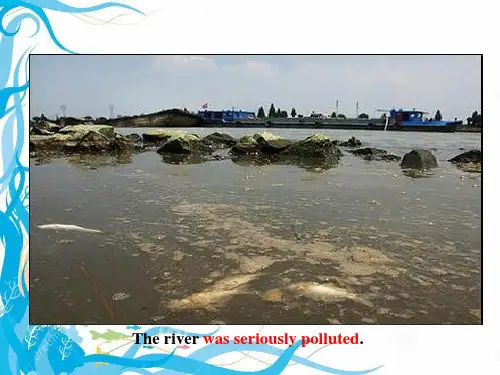
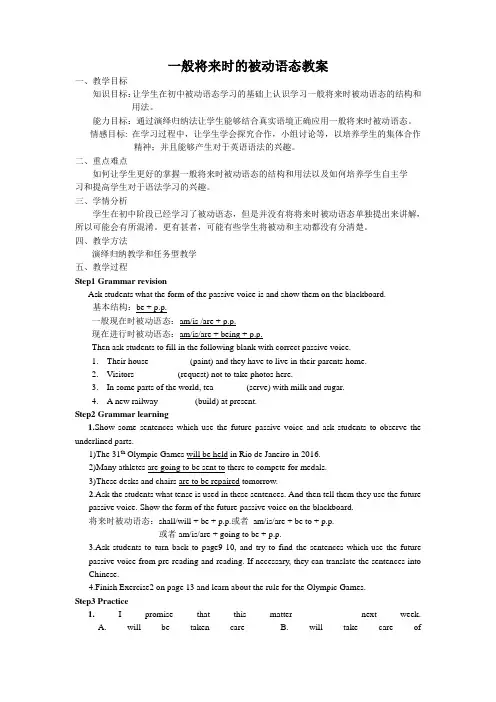
一般将来时的被动语态教案一、教学目标知识目标:让学生在初中被动语态学习的基础上认识学习一般将来时被动语态的结构和用法。
能力目标:通过演绎归纳法让学生能够结合真实语境正确应用一般将来时被动语态。
情感目标: 在学习过程中,让学生学会探究合作,小组讨论等,以培养学生的集体合作精神;并且能够产生对于英语语法的兴趣。
二、重点难点如何让学生更好的掌握一般将来时被动语态的结构和用法以及如何培养学生自主学习和提高学生对于语法学习的兴趣。
三、学情分析学生在初中阶段已经学习了被动语态,但是并没有将将来时被动语态单独提出来讲解,所以可能会有所混淆。
更有甚者,可能有些学生将被动和主动都没有分清楚。
四、教学方法演绎归纳教学和任务型教学五、教学过程Step1 Grammar revisionAsk students what the form of the passive voice is and show them on the blackboard.基本结构:be + p.p.一般现在时被动语态:am/is /are + p.p.现在进行时被动语态:am/is/are + being + p.p.Then ask students to fill in the following blank with correct passive voice.1.Their house _________(paint) and they have to live in their parents home.2.Visitors _________ (request) not to take photos here.3.In some parts of the world, tea _______(serve) with milk and sugar.4. A new railway ________(build) at present.Step2 Grammar learning1.Show some sentences which use the future passive voice and ask students to observe the underlined parts.1)The 31th Olympic Games will be held in Rio de Janeiro in 2016.2)Many athletes are going to be sent to there to compete for medals.3)These desks and chairs are to be repaired tomorrow.2.Ask the students what tense is used in these sentences. And then tell them they use the futurepassive voice. Show the form of the future passive voice on the blackboard.将来时被动语态:shall/will + be + p.p.或者am/is/are + be to + p.p.或者am/is/are + going to be + p.p.3.Ask students to turn back to page9-10, and try to find the sentences which use the futurepassive voice from pre-reading and reading. If necessary, they can translate the sentences into Chinese.4.Finish Exercise2 on page 13 and learn about the rule for the Olympic Games.Step3 Practice1. I promise that this matter _____ next week.A. will be taken careB. will take care ofC. will take good careD. will be taken care of2. These dictionaries _____ the library again (by you ).A. will be taken out ofB. won’t be taken out ofC. will take out ofD. won’t take out of3. The class ____ on everything they have learnt this year.A. is going to be examiningB. are going to examineC. is going to be examinedD. are going to be examined4. An exhibition of painting _____ at the art museum when he comes back from abroad.A. is going to holdB. is going to be heldC. are going to holdD. are going to be held5.We are told that a new car factory _____ here next year.A. will set upB. will be set upC. would set upD. would be set up6. The 2008 Olympic Games _____ in Beijing; several big changes _____ in the capital city.A. is held; will makeB. will be held; will makeC. will be held; will be madeD. is held; make7. You _____ to take so much luggage with you on the plane.A. will be allowedB. will allowC. won’t be allowedD. won’t allow8. You _____ around our school this afternoon. Now, please have a good rest.A. are shownB. were shownC. are going to be shownD. will showStep4 Summarize the grammar rules1.一般将来时的被动语态的几种句式2.一般将来时的被动语态的用法(1)表示根据计划或者安排将要发生的被动动作。
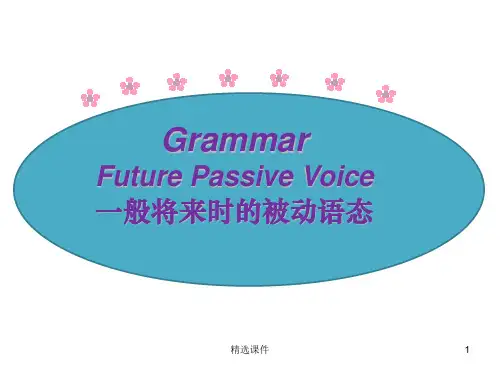
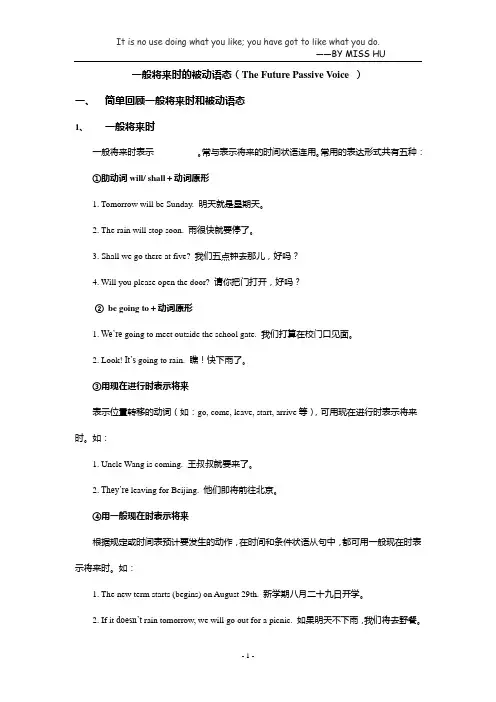
一般将来时的被动语态(The Future Passive Voice )一、简单回顾一般将来时和被动语态1、一般将来时一般将来时表示__________。
常与表示将来的时间状语连用。
常用的表达形式共有五种:①助动词will/ shall+动词原形1. Tomorrow will be Sunday. 明天就是星期天。
2. The rain will stop soon. 雨很快就要停了。
3. Shall we go there at five? 我们五点钟去那儿,好吗?4. Will you please open the door? 请你把门打开,好吗?②be going to+动词原形1. We’re going to meet outside the school gate. 我们打算在校门口见面。
2. Look! It’s going to rain. 瞧!快下雨了。
③用现在进行时表示将来表示位置转移的动词(如:go, come, leave, start, arrive等),可用现在进行时表示将来时。
如:1. Uncle Wang is coming. 王叔叔就要来了。
2. They’re leaving for Beijing. 他们即将前往北京。
④用一般现在时表示将来根据规定或时间表预计要发生的动作,在时间和条件状语从句中,都可用一般现在时表示将来时。
如:1. The new term starts (begins) on August 29th. 新学期八月二十九日开学。
2. If it doesn’t rain tomorrow, we will go out for a picnic. 如果明天不下雨,我们将去野餐。
⑤“be+动词不定式”或“be about to +动词原形”1. He is to visit Japan next year. 明年他将访问日本。
2. They’re about to leave. 他们就要走了。
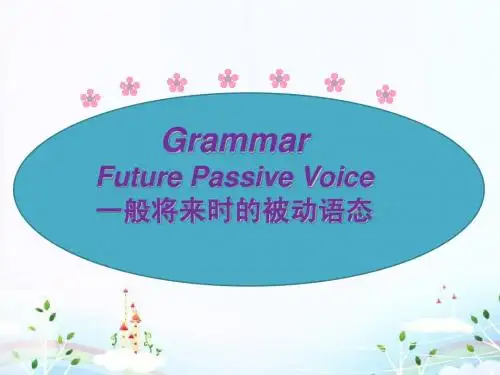
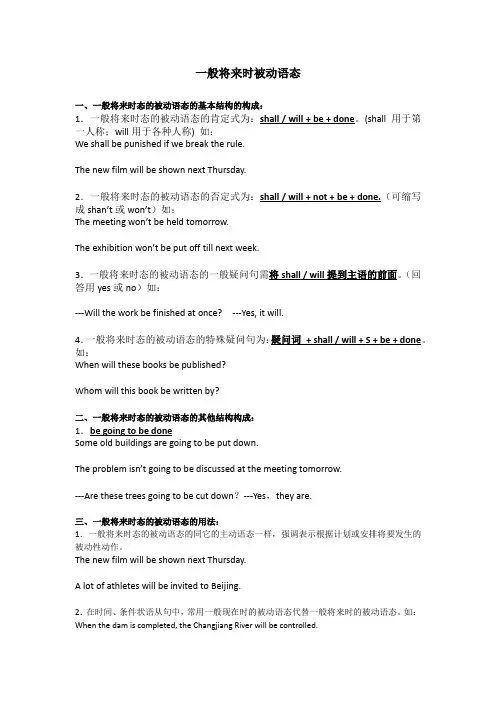
一般将来时被动语态一、一般将来时态的被动语态的基本结构的构成:1.一般将来时态的被动语态的肯定式为:shall / will + be + done。
(shall 用于第一人称;will用于各种人称) 如:We shall be punished if we break the rule.The new film will be shown next Thursday.2.一般将来时态的被动语态的否定式为:shall / will + not + be + done.(可缩写成shan’t或won’t)如:The meeting won’t be held tomorrow.The exhibition won’t be put off till next week.3.一般将来时态的被动语态的一般疑问句需将shall / will提到主语的前面。
(回答用yes或no)如:---Will the work be finished at once? ---Yes, it will.4.一般将来时态的被动语态的特殊疑问句为:疑问词+ shall / will + S + be + done。
如:When will these books be published?Whom will this book be written by?二、一般将来时态的被动语态的其他结构构成:1.be going to be doneSome old buildings are going to be put down.The problem isn’t going to be discussed at the meeting tomorrow.---Are these trees going to be cut down?---Yes,they are.三、一般将来时态的被动语态的用法:1.一般将来时态的被动语态的同它的主动语态一样,强调表示根据计划或安排将要发生的被动性动作。
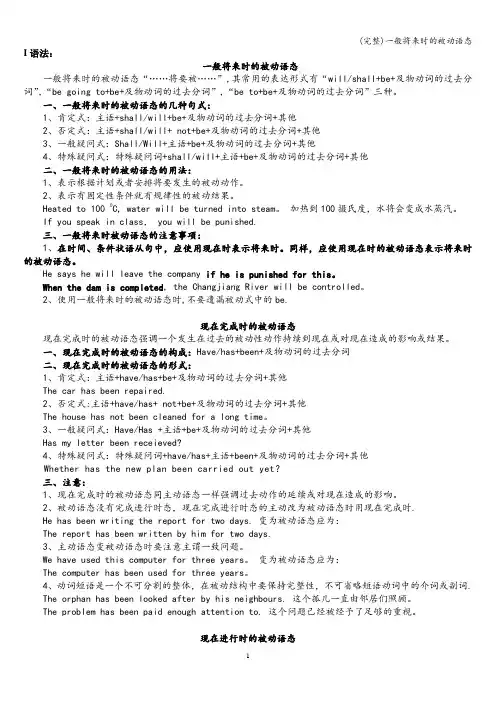
I语法:一般将来时的被动语态一般将来时的被动语态“……将要被……”,其常用的表达形式有“will/shall+be+及物动词的过去分词”,“be going to+be+及物动词的过去分词”,“be to+be+及物动词的过去分词”三种。
一、一般将来时的被动语态的几种句式:1、肯定式:主语+shall/will+be+及物动词的过去分词+其他2、否定式:主语+shall/will+ not+be+及物动词的过去分词+其他3、一般疑问式:Shall/Will+主语+be+及物动词的过去分词+其他4、特殊疑问式:特殊疑问词+shall/will+主语+be+及物动词的过去分词+其他二、一般将来时的被动语态的用法:1、表示根据计划或者安排将要发生的被动动作。
2、表示有固定性条件就有规律性的被动结果。
Heated to 100 0C, water will be turned into steam。
加热到100摄氏度,水将会变成水蒸汽。
If you speak in class, you will be punished.三、一般将来时被动语态的注意事项:1、在时间、条件状语从句中,应使用现在时表示将来时。
同样,应使用现在时的被动语态表示将来时的被动语态。
He says he will leave the company if he is punished for this。
When the dam is completed, the Changjiang River will be controlled。
2、使用一般将来时的被动语态时,不要遗漏被动式中的be.现在完成时的被动语态现在完成时的被动语态强调一个发生在过去的被动性动作持续到现在或对现在造成的影响或结果。
一、现在完成时的被动语态的构成:Have/has+been+及物动词的过去分词二、现在完成时的被动语态的形式:1、肯定式:主语+have/has+be+及物动词的过去分词+其他The car has been repaired.2、否定式:主语+have/has+ not+be+及物动词的过去分词+其他The house has not been cleaned for a long time。
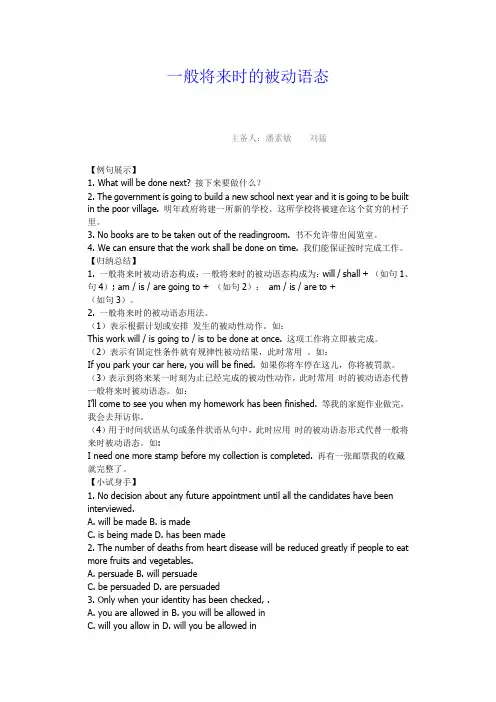
一般将来时的被动语态主备人:潘素敏刘猛【例句展示】1. What will be done next? 接下来要做什么?2. The government is going to build a new school next year and it is going to be built in the poor village. 明年政府将建一所新的学校。
这所学校将被建在这个贫穷的村子里。
3. No books are to be taken out of the readingroom. 书不允许带出阅览室。
4. We can ensure that the work shall be done on time. 我们能保证按时完成工作。
【归纳总结】1. 一般将来时被动语态构成:一般将来时的被动语态构成为:will / shall + (如句1、句4); am / is / are going to + (如句2);am / is / are to +(如句3)。
2. 一般将来时的被动语态用法。
(1)表示根据计划或安排发生的被动性动作。
如:This work will / is going to / is to be done at once. 这项工作将立即被完成。
(2)表示有固定性条件就有规律性被动结果,此时常用。
如:If you park your car here, you will be fined. 如果你将车停在这儿,你将被罚款。
(3)表示到将来某一时刻为止已经完成的被动性动作,此时常用时的被动语态代替一般将来时被动语态。
如:I’ll come to see you when m y homework has been finished. 等我的家庭作业做完,我会去拜访你。
(4)用于时间状语从句或条件状语从句中,此时应用时的被动语态形式代替一般将来时被动语态。
如:I need one more stamp before my collection is completed. 再有一张邮票我的收藏就完整了。

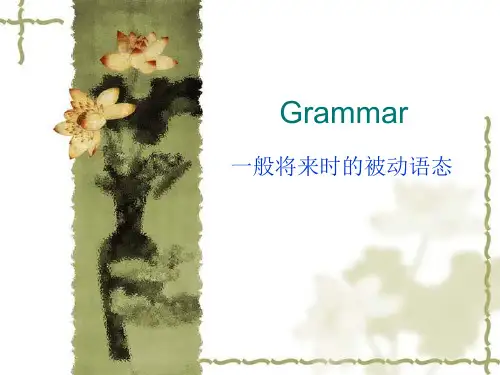

Module 9 Great Inventions (伟大的发明)一般将来时的被动语态:结构:be going to /will/ shall/ +be +动词的过去分词肯定句:主语+will be +done +by 或主语+am / is / are going to be done +byA highway will be constructed in our city. 明年我们市将要修建一条公路。
The problem is going to be discussed at tomorrow’s meeting. 这个问题要在明天的会议上讨论。
否定句:主语+will not be +done 主语+am / is / are not going to be +doneHe won’t be invited to this party. 他将不会被邀请参加这次聚会。
The old library isn’t going to be pulled down next month. 那座旧图书馆下个月不会被拆除。
一般疑问句:will +主语+be done Will they be allowed to go ?他们会被允许去吗?Am / is / are +主语+going to be +doneIs his new book going to be published next week? 他的新书下个月就要出版了吗?特殊疑问句:特殊疑问词+will +主语+be +done When will the work be finished ?这项工作什么时候能完成?特殊疑问词+ be +主语+going to be +doneWhere is the football match going to be held next week? 下周足球比赛要在哪儿举行?What is going to be held next week in our school? 下周我们学校要举办什么活动? 表示将来意义的被动结构还有等。